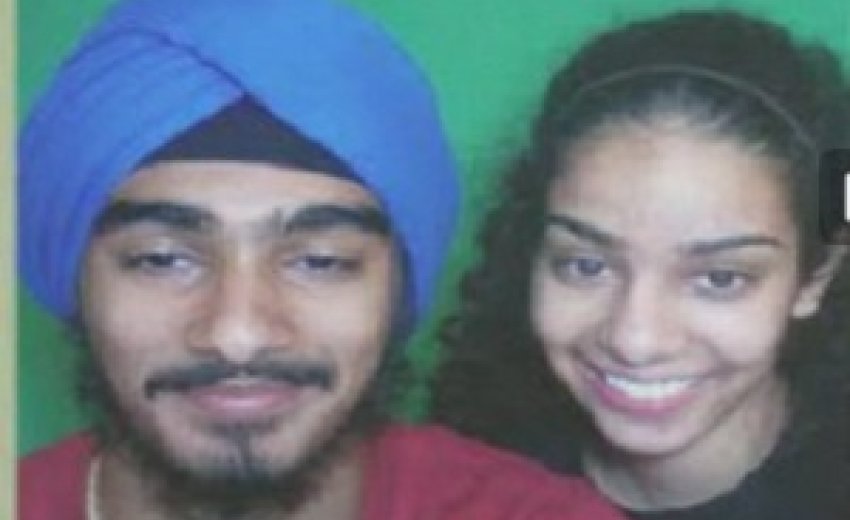An art and film festival in Orange County strives to raise awareness about the religion and its followers and dispel misconceptions.
 |
| Don Bartletti, Los Angeles Times |
| For their film, Harnek Singh Neelam, left, and Rasna Kaur Neelam, 16, went around their hometown of Detroit asking strangers what they thought when they saw Harnek’s turban and what they knew of Sikhism. |
Nov 27, 2010: In one of the opening scenes of a light-hearted new film about Sikhism, the young filmmakers pose a challenge: If every Sikh could educate 300 people about the religion, then awareness of the faith would be a reality.
The film-makers, 16-year-old twins Rasna Kaur Neelam and Harnek Singh Neelam, are doing their part in that regard. Their film — with its tongue-in-cheek title "Iz yu ignant bout Sikhi?" — was included in a recent Sikh festival at Chapman University.
To make it, the siblings traveled around their hometown of Detroit, asking strangers what they thought when they saw Harnek's turban and what, if anything, they knew about Sikhism, the world's fifth-largest religion. The twins said they hoped to spread knowledge with their 25-minute film, but also wanted to steer clear of preaching.
Throughout their interviews, they encountered many of the same questions and comments, they said, some politically correct, others unintentionally humorous.
"I don't have any problems with turbans," one heavyset man says in response to the pair's questions. "It's the, the other thing like a towel."
Using a flip camera and films like the 2006 comedy "Borat" as inspiration, the twins interviewed their subjects in such locations as the Detroit zoo, various museums and fast-food restaurants. And although they didn't interview 300 people in their week of filming, they say they have probably spoken to that many about their religion over their lifetimes.
"I want people to know who I am and not just stereotypes," said Harnek Singh. "This was my way of educating people. As I grow up, I hope my kids don't have to go through the same problems that I went through." He said he faced ridicule in elementary school and has often been chosen for random security checks at airports, apparently because of his turban.
There are about 25 million Sikhs worldwide and about 500,000 in the United States, according to the World Sikh Council, America Region, which represents temples and institutions across the country and focuses on advocacy and education.
But Sikhs in the U.S. have struggled at times to create awareness of who they are. They have often been confused with followers of Hinduism or Islam, especially after the Sept. 11 attacks, when hate crimes against Sikhs increased, apparently in the belief they were Muslims.
To that end, the Sikh Art and Film Festival was held at Chapman University last weekend showing a diverse line-up of films about Sikhs around the world.
"We are our own religion; we are our own entity," said Asees Singh, one of the festival organizers. "And that's something that we aim to create awareness about through this festival. So when they come to the festival, they learn about the culture, they learn about the heritage."
Hundreds of people attended the three-day event, and organizers noted that many were non-Sikhs invited through community partnerships or through the university's film school.
When President Obama did not visit the Golden Temple, the spiritual center of Sikhism, on his recent trip to India, speculation arose that the reason was he would have had to wear a head covering that could link him with a non-Christian religion. The White House said publicly only that the temple visit did not fit into the president's schedule.
Many in the local Sikh community were disappointed by the decision, which they said underscored a feeling that they have made little progress in educating Americans about their faith.
"How is this happening in this day and age and with a president who knows who we are?" asked Birpal Kaur, another festival organizer and a community relations associate with the Sikh American Legal Defense Education Fund. "So this is giving us a chance to step back and reassess where we are and where we would like to be."
She noted that Obama did, however, wish the community a happy Gurpurab, the birthday of the religion's founder, and had included Sikhs in his message marking Diwali, the festival of lights that is also celebrated by Hindus and Jains.
For Sikhs, the challenge may be to find a way to distinguish themselves from Muslims and Hindus without seeming to put down followers of those religions.
"I think we did have to do a lot of negating, because people would say, 'Oh, I know who Sikhs are,' and they would have a wrong idea," said Rasna Kaur. She and her brother spoke in an interview this week after their film was shown at the Chapman festival. "A lot of what we were doing was correcting people's preconceived notions, and once we were done with that, we could tell them who we really are."
Films at the festival focused on a range of issues, including stories of dealing with post- 9/11 issues, of Sikhs who fought for Britain in the first and second world wars and of the struggles of Sikh immigrants. The festival's feature film was "Partition," a love story revolving around the tumultuous partition of India, which led to the creation of Pakistan.
The films were intended to educate Sikhs and non-Sikhs alike about the diversity of the faith's adherents. Focusing too much on differentiating themselves from other religions, said festival organizer Ravin Kohli, could end up playing into stereotypes.
"A lot of our education isn't, 'Hey, we aren't these people,' it's been, 'Hey, this is who we are, this is our culture, these are our practices,' " she said. "Our message isn't about negating, it's about educating."
Copyright © 2010, Los Angeles Times
